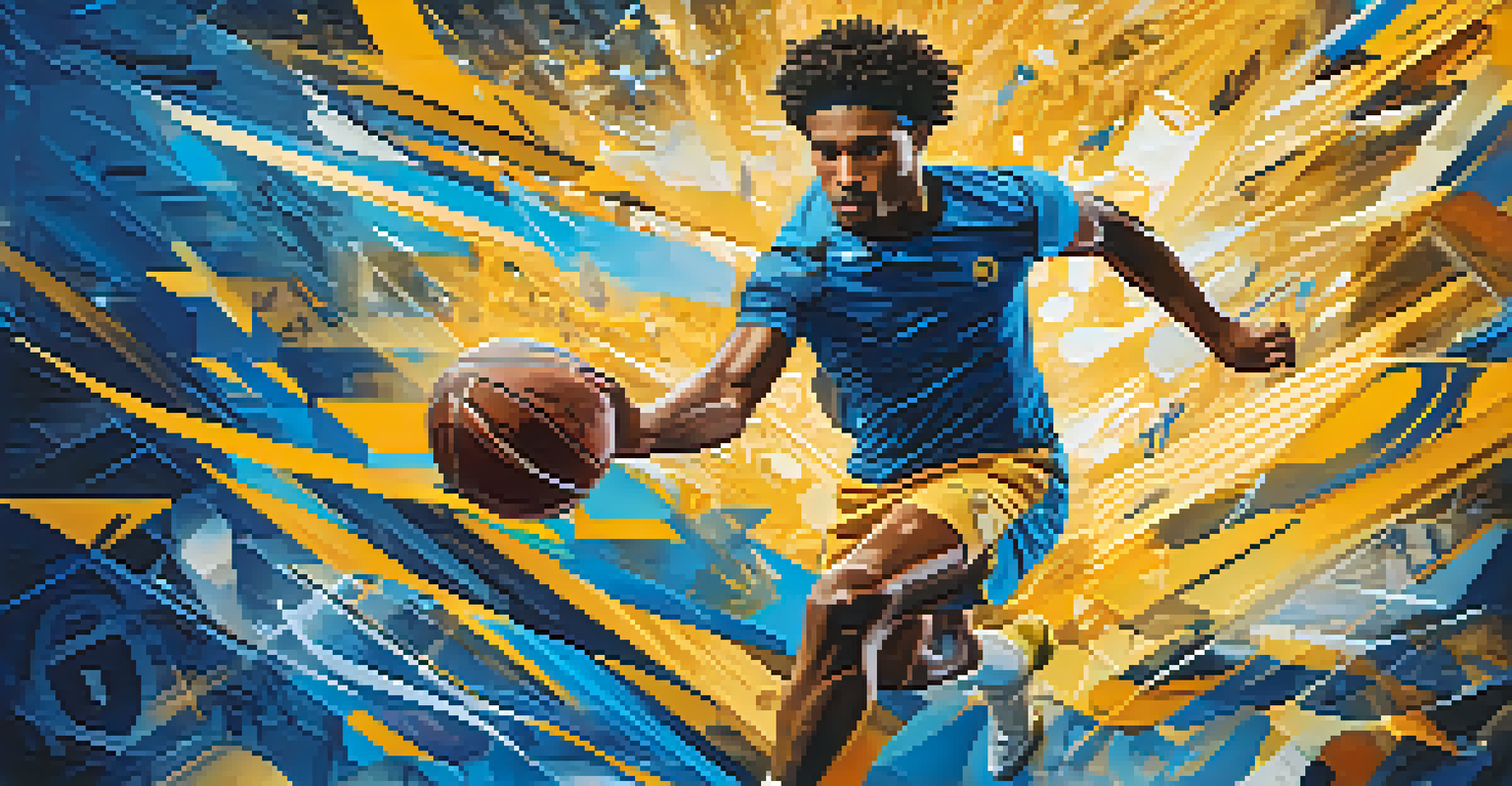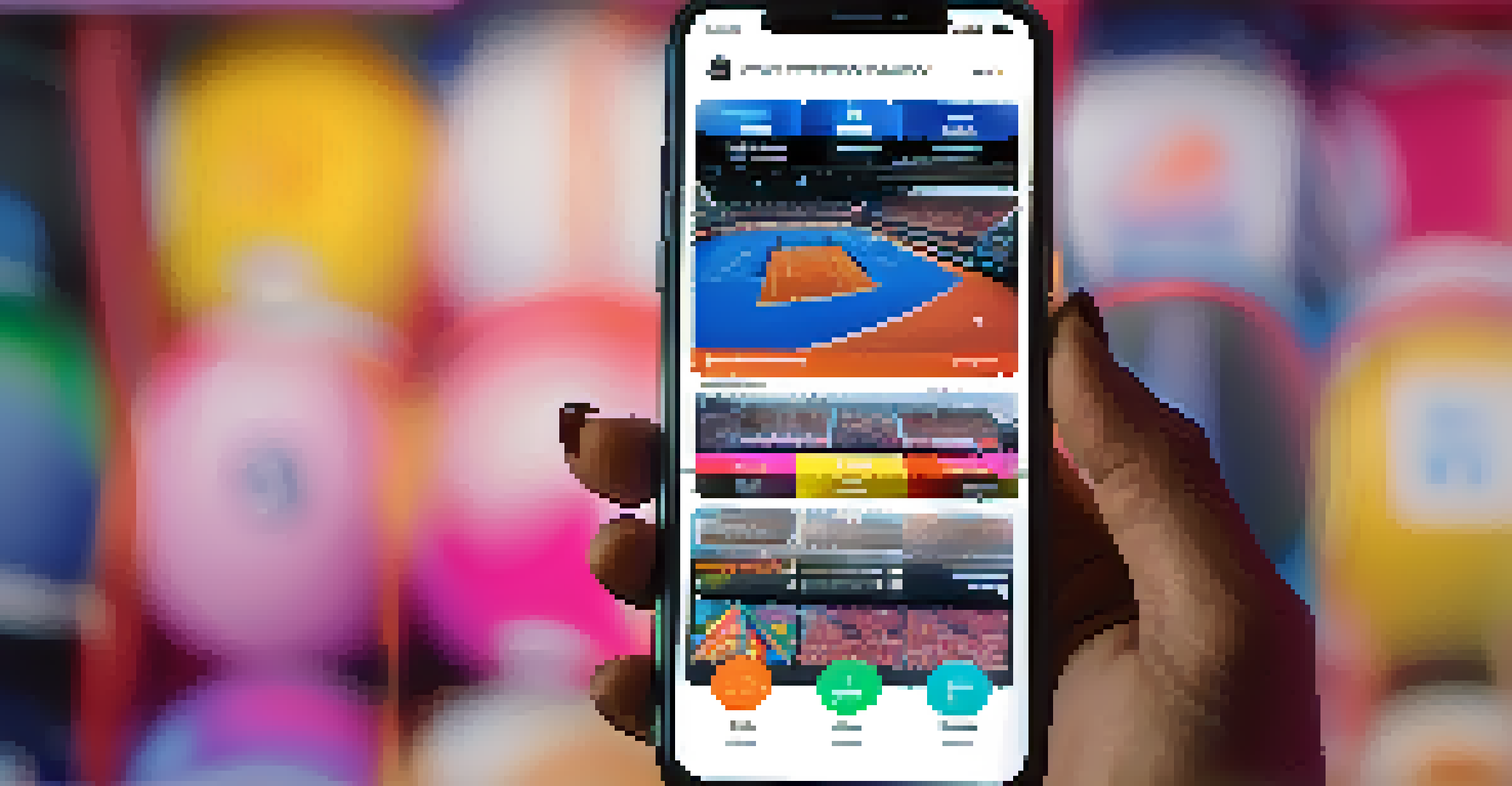NFTs in Sports: Collectible Moments and Fan Engagement

Understanding NFTs and Their Impact on Sports Collectibles
NFTs, or non-fungible tokens, are unique digital assets stored on a blockchain, which makes them distinct from traditional cryptocurrencies. In the sports world, they represent everything from iconic moments in games to player highlights, creating a new realm of collectibles. Fans can purchase, trade, or sell these moments, often for significant sums, making them a hot commodity among collectors.
NFTs are revolutionizing how fans engage with their favorite teams and athletes, creating a deeper sense of community and loyalty.
The rise of NFTs has introduced a digital twist to the traditional sports memorabilia market. Instead of physical cards or signed jerseys, fans are now able to own a piece of digital history that can be verified for authenticity. This shift not only broadens access but also appeals to a younger audience that values digital ownership and experiences.
As the technology matures, we’re seeing various sports leagues and teams diving into the NFT space. The NBA, for instance, launched its NBA Top Shot platform, allowing fans to buy, sell, and trade officially licensed highlights from games, creating a new level of engagement and excitement around the sport.
How NFTs Enhance Fan Engagement in Sports
NFTs are not just about collectibles; they are redefining how fans engage with their favorite teams and athletes. By offering unique digital experiences—like virtual meet-and-greets or exclusive content—teams can connect with fans in ways that were previously unimaginable. This engagement fosters a stronger sense of community and loyalty among supporters.

For example, some teams offer NFTs that grant holders access to special events, merchandise, or even voting rights on certain team decisions. This added layer of interaction makes fans feel more involved in their team's journey, enhancing their overall experience. It’s like having a VIP pass to the sports world, all thanks to digital tokens.
NFTs Transform Sports Collectibles
NFTs offer a unique way for fans to own, trade, and engage with digital sports memorabilia, reshaping the collectibles market.
Moreover, NFTs can also serve as a bridge between fans and athletes. When players release their own NFT collections, they not only showcase their achievements but also interact directly with their supporters, creating a personal connection. This direct engagement can lead to a more passionate and dedicated fan base.
The Growing Popularity of NFT Marketplaces
As interest in NFTs continues to grow, several marketplaces have emerged, catering specifically to sports collectibles. Platforms like OpenSea and Rarible allow users to buy, sell, and discover unique sports NFTs, attracting both casual fans and serious collectors alike. This democratizes access to sports memorabilia, making it easier for everyone to participate.
The potential for NFTs in sports lies not just in collectibles, but in the transformative experiences they can offer fans.
These marketplaces often feature limited-edition drops or exclusive collaborations with athletes and teams, creating a buzz around new releases. Fans eagerly await these drops, akin to waiting for a highly anticipated game or season opener. The thrill of snagging a rare NFT can be as exhilarating as catching a game-winning touchdown.
Additionally, the transparency of blockchain technology ensures that every transaction is secure and easily traceable. This builds trust among buyers, as they can verify the authenticity and ownership history of their digital collectibles, similar to checking the provenance of a fine art piece.
Challenges and Criticisms of NFTs in Sports
While NFTs bring exciting opportunities, they are not without their challenges and criticisms. Concerns about environmental impact due to the energy consumption of blockchain technology have been raised, prompting discussions about more sustainable practices. This aspect has led some fans to question the long-term viability of NFTs in sports.
Another criticism revolves around accessibility; not everyone can afford high-priced NFTs, which could create a divide among fans. This exclusivity might limit participation to wealthier individuals, undermining the community spirit that sports traditionally foster. Finding a balance between exclusivity and inclusivity is crucial for the future of NFTs in sports.
Enhanced Fan Engagement Opportunities
Through NFTs, teams can create deeper connections with fans by providing exclusive digital experiences and interactions.
Moreover, the volatility of the NFT market poses risks for collectors. Prices can fluctuate dramatically, and what might seem like a valuable collectible today could lose its worth tomorrow. As with any investment, potential buyers need to conduct thorough research before diving into the NFT scene.
NFTs as a New Revenue Stream for Sports Organizations
One of the most appealing aspects of NFTs for sports organizations is the potential for new revenue streams. By creating and selling digital collectibles, teams can tap into a lucrative market that extends their earnings beyond traditional ticket sales and merchandise. This can be particularly beneficial for smaller teams or leagues seeking additional funding.
Furthermore, NFTs can provide ongoing revenue through royalties. Whenever an NFT is resold on the secondary market, a percentage of the sale can go back to the original creator, meaning teams and players can continue to benefit from their digital assets over time. It’s like earning a commission every time someone trades a piece of your art.
This innovative approach not only increases financial stability for organizations but also encourages them to invest more in fan engagement and experience. As teams explore creative NFT offerings, they can further enhance their connections with fans while reaping financial rewards.
The Future of NFTs in Sports: Trends to Watch
Looking ahead, the future of NFTs in sports is teeming with potential and emerging trends. One significant trend is the integration of augmented reality (AR) and virtual reality (VR) experiences with NFTs. Imagine being able to don a VR headset and step into a digital stadium to view your favorite moments in a whole new way—this could revolutionize fan engagement.
Another trend to watch is the continued collaboration between athletes and artists. Many players are now partnering with digital artists to create unique NFT collections that reflect their personal journeys or milestones. This fusion of sports and art not only elevates the collectible experience but also showcases the diverse talents within the sports community.
Emerging Revenue Streams for Teams
NFTs present sports organizations with new avenues for revenue generation, allowing them to profit from digital collectibles and ongoing royalties.
Lastly, as the technology matures, we may see an increase in user-friendly platforms that simplify the process of buying, selling, and creating NFTs. Making this technology accessible to a broader audience will be key in driving adoption and ensuring that NFTs become a staple in the sports landscape.
Conclusion: Embracing the NFT Revolution in Sports
In conclusion, NFTs are undeniably reshaping the sports landscape, transforming how fans engage with their favorite teams and athletes. They provide new avenues for interaction, creativity, and revenue generation while also presenting unique challenges that must be navigated thoughtfully. As the technology evolves, it will be fascinating to see how sports organizations adapt and innovate in this digital age.
By embracing NFTs, teams can cultivate deeper connections with fans while exploring new business opportunities. This revolutionary shift is not just about digital collectibles; it's about enhancing the overall fan experience and creating lasting memories. The potential for growth and engagement in the sports world is immense, and NFTs are at the forefront of this transformation.

As we step into this exciting era, both fans and organizations must remain open to the possibilities that NFTs offer. By doing so, they can become part of a vibrant community that celebrates not just sports, but the shared passion and experiences that unite fans across the globe.